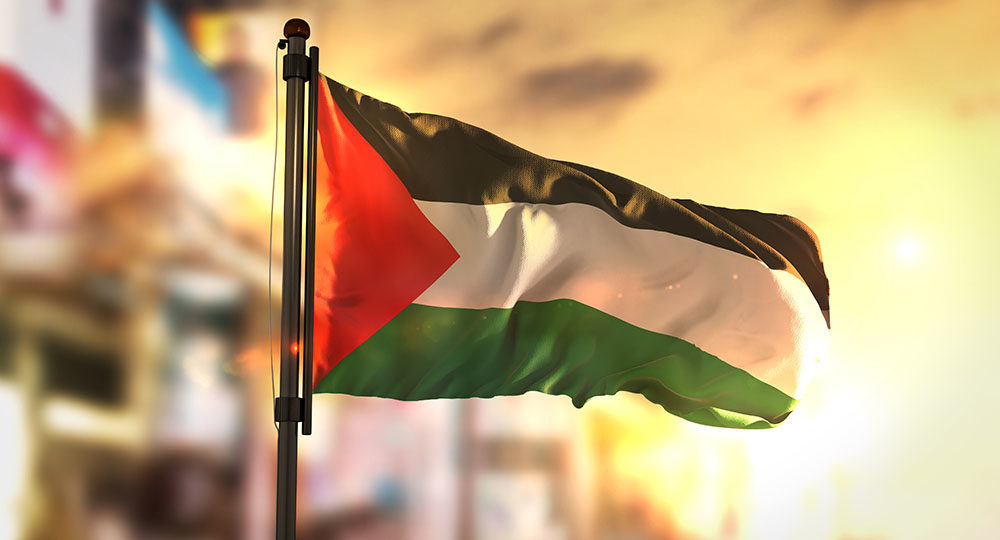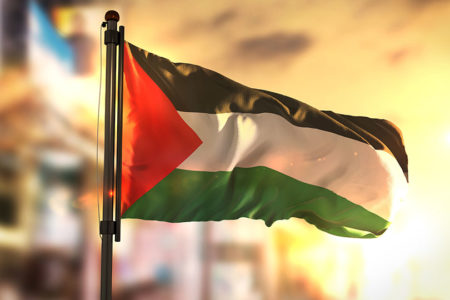The Many States of Palestine
An early Zionist leader was fond of speaking of the land that was to become Israel as “a land without a people for a people without a land.” Although his observation was, in large measure, accurate, it was not quite the whole of the reality that would become the Jewish experience. When they returned to the land of their fathers, there was an Arab presence that would prove to be a thorn in the side of the emerging nation.
The resulting conflict, and particularly the furor caused over the establishment of an independent state of Palestine, has been a contentious and, to say the least, divisive issue throughout the entire existence of the State of Israel. It is not a question of whether there will be a state of Palestine, but what nature and direction that state will take once it is fully established. Will it become a good neighbor to Israel? Or will Palestinians use it as a launching pad for what they hope will be the final annihilation of the Jewish state?
Why “Palestine”?
The Romans, who ruled the ancient Mediterranean world two thousand years ago, coined the name Palestine. It was adapted from the name of the Philistines, who occupied parts of the region as hostile contemporaries of ancient Israel. Some historians believe that the Romans chose the name as a way of erasing the memory of the Jewish people and their association with the land. The Roman historian Herodotus was the first to mention the name. He called it “the Philistine Syria.” Subsequently, the name was shortened to “Palestina,” and eventually Palestine.
The “Christian” Crusaders employed the word to refer to the general area that had been known since the fourth century as the “three Palestines.” After the fall of the crusader kingdom, Palestine was no longer an official designation. The name, however, continued to be used informally for the lands on both sides of the Jordan River.
When the Ottoman Turks, who were non-Arabs but religious Muslims, took over the area, they ruled for approximately 400 years. Under Ottoman rule, Palestine was never an administrative unit. It was part of the province of Syria.
That situation prevailed until the Ottoman Empire fell, and, in 1922, the British, who had received the Mandate over Palestine from the League of Nations, restricted the application of the name to the area west of the Jordan River. The land east of the river became known as Transjordan, which in 1946 became the Kingdom of Jordan.
In the end, the name Palestine was restricted to the portion west of the Jordan River now known as Israel. This historical information is important when approaching the problem of establishing a Palestinian state because, in so doing, a completely new national entity is being formed. Contrary to current claims by the Palestinians, there has never in the past been an Arab state of Palestine.
Mr. David Bar-Illan, former Executive Editor of the Jerusalem Post, addressed the subject in an article first published in November 1998 in the Los Angeles Times. He wrote,
In a recent speech to the United Nations General Assembly, Yasser Arafat talked of “the need to realize justice for the Palestinian people, to restore their international status and their seat in the United Nations.” He referred to “our country, Palestine” and expressed the hope that it would be “restored its freedom.”
The meaning of this message is clear: Palestine is a country that belonged to the Palestinians until it was invaded and usurped by the Jews. Jerusalem was the Palestinian capital now being Judaized by Israel. Justice will be served only if the Palestinians are allowed to re-establish their sovereignty in it.
That all this is unadulterated fiction has not prevented many governments from accepting it. Nor has it deterred pundits from upbraiding Israel for failing to “give back” Palestinian land.
In fact, there never has been a state called Palestine, nor have the Palestinian Arabs ever been an independent people, and Jerusalem never has been an Arab or Muslim capital. Jerusalem has had an absolute Jewish majority for more than a century (and a plurality before that), and for the last three thousand years, only the Jewish people have called it their capital.…To inveigh against “Judaizing” Jerusalem is like protesting the Arabization of Cairo.
Who Are the Palestinians?
The word Palestinian, as commonly employed today, is a relatively recent term. Until the end of the British Mandate over Palestine in 1948, all inhabitants of the area west of the Jordan River were known as Palestinians. In other words, a Jewish person living in what is now Israel was referred to as a “Palestinian Jew.” An Arab living in the same area was a “Palestinian Arab.” Likewise, a Christian was known as a “Palestinian Christian.” It was as simple as that.
Palestine ceased to exist as a legal entity after 1948, when Britain relinquished the Mandate and Israel became a modern state. For their part, the Palestinians joined the rest of the Arab world in rejecting the UN Partition Plan of 1947 and moved to destroy the fledgling State of Israel. After failing to do so, and following five attempts to wipe out the Jewish state, the Palestinians decided to change their tactics, if not their final goal, and begin negotiating with Israel.
The Right of Prior Claim
Palestinian leaders settled on a rather ingenious plan that sprang from the idea that, as “Palestinians,” they had a legitimate prior claim to the Holy Land. The very name they assumed as their birthright seemed to many to legitimatize their claim. They were willing to go so far as to say that Jews had no ancient presence in the land or on the Temple Mount that predated the Arab Palestinians. Yasser Arafat added insult to injury by claiming that his people, not the Jews, were the original brethren and followers of Jesus of Nazareth. Indeed, he claimed that Jesus was a freedom fighter against the Romans, just as he himself is a freedom fighter attempting to break the hold of the Israelis on his people. As bizarre as this scenario seems to those who are biblically and historically literate, these preposterous claims reportedly received a standing ovation before 400 certified journalists in a speech Arafat made in Geneva, Switzerland.
Thus, they argue, this being the case, the Palestinians have the right, not only to a state, but also to Jerusalem as their capital city.
The Many States of Palestine
In the beginning, the strategy of the Arab world and the Palestinians was very simple: Destroy those pestiferous Zionists and drive them into the sea. It did not appear to be a problem. After all, millions of hostile Arabs surrounded a tiny area no larger than the state of New Jersey. In spite of numerical superiority, however, they were not successful. Although Israel paid a very high price for its survival, it remained intact as a sovereign nation.
Phase two then became the negotiation track. First, it was to be a Palestinian state back to the 1967 armistice lines. Then, Arafat’s stated goal was to push Israel back to the 1948 lines. All the while, Arafat and his cohorts were assuring the Arab world that this was only a tactical maneuver—first ’67, then ’48, then, for the Zionist Jews, the Mediterranean Sea. It seemed for a time that this strategy would work, with “land for peace” platitudes flying like kites in the wind. And, indeed, Israel was conceding land that it could not afford to give away. For the Palestinians, however, it was real progress, for all they needed was a bit of patience and they would have their way. A little piece here, a little piece there, and soon they would have it all. In fact, 98 percent of all Arabs on the West Bank and in Gaza are today under Palestinian control.
Encouraged by steadfast friends in the U.S. State Department and the European community, they would not stop at attempting to devour Israel a piece at a time. Yasser Arafat turned back the clock and, in an act of feigned great magnanimity, decided to accept United Nations Resolution 181, which was the original Partition of Palestine adopted in 1947 but soundly rejected by Palestinians and the world of Islam. Presently, they stand to gain a further dissecting of little Israel into six small portions—three for Israel and three for the Palestinians—with Jerusalem becoming an international city controlled by benevolent Gentiles. The Europeans love the idea. Israel, as we would expect, is revulsed and legitimately cites irrevocable facts on the ground that have made Resolution 181 null and void.
But this was not the last word. Retreating again to the UN decisions of 1948, the Palestinians then championed the Arab “Right of Return,” embodied in UN Resolution 194, dated December 11, 1948, which states:
“[The General Assembly] resolves that the refugees wishing to return to their homes and live in peace with their neighbors should be permitted to do so at the earliest practicable date.”
Such a return would mean that one to two million Palestinian “refugees,” by Arab estimates, would have the right to move into Israel proper—that is, the portion left after the dissection of the Jewish state. The Palestinians and their apologists are willing to forget at least two things. First, they unanimously rejected this resolution when it was originally offered; and second, there is no mention of the right of return for Jews who were expelled from Arab countries after 1948.
The Israeli position is that if Arab “refugees” are to be compensated for the loss of property, as Israelis have agreed should be the case, then Jews expelled from Arab countries are entitled to the same treatment. It seems to have slipped through the cracks in the minds of Western negotiators that, while half a million Arabs were displaced after the 1948 and 1967 conflicts, eight hundred thousand Jews were driven out of Arab lands at the same time, suffering the loss of homes, businesses, and bank accounts. Fair is fair, and if Israel is to compensate Arabs, it is logical that Arabs are obligated to return the favor.
The Prophetic Implications
Resident in all of these issues are immense prophetic implications. As I write, NATO is involved in a “humanitarian mission” in the Balkans. In the process, they have alienated the Russians, the Yugoslavians, the Chinese, and a host of nations too numerous to mention. Where does this leave us?
The leaders of NATO (the Western European Alliance) have said that they will now extend their “humanitarian” intrusions far beyond the borders of Western Europe. Where will they go? Certainly not to China or Russia or Sudan. The only vulnerable place that seems to hold out a promise for success is the Middle East. After all, Israel is a friend, and America has been very good at chastising its friends lately.
But think about this: In the last days, Western Europe, led by the Antichrist, with America trailing behind, will antagonize Russia, key Islamic nations, and the “kings of the east” (Rev. 16:12), namely China. And we must not forget that the center of the action will be Jerusalem and the nation of Israel. In recent days, we have seen the American flag burned and U.S. embassies in the Balkans, Russia, and China pelted with rocks, paint, and assorted hand-thrown missiles. We are rapidly gaining the reputation of being a pariah nation in many parts of the world. Are these events diminishing the role of the United States as a respected world power? Are conflicts in Europe sapping our economic and military resources to the point that we will be forced into the position of a follower, an also-ran nation?
We don’t read prophecy through the pages of our newspapers, and there could be many twists and turns before the final events are unveiled. However, what we are witnessing should certainly awaken us to the fact that it is getting late—very late.







